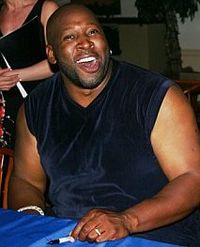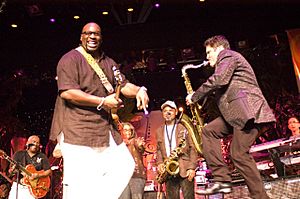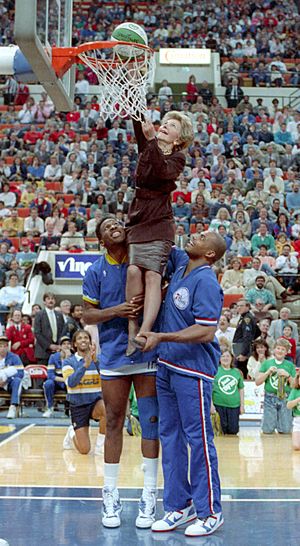Wayman Tisdale facts for kids

Tisdale at a CD release party in 2006
|
||||||||||||||||||||
| Personal information | ||||||||||||||||||||
|---|---|---|---|---|---|---|---|---|---|---|---|---|---|---|---|---|---|---|---|---|
| Born | June 9, 1964 Fort Worth, Texas, U.S. |
|||||||||||||||||||
| Died | May 15, 2009 (aged 44) Tulsa, Oklahoma, U.S. |
|||||||||||||||||||
| High school | Booker T. Washington (Tulsa, Oklahoma) |
|||||||||||||||||||
| Listed height | 6 ft 9 in (2.06 m) | |||||||||||||||||||
| Listed weight | 260 lb (118 kg) | |||||||||||||||||||
| Career information | ||||||||||||||||||||
| College | Oklahoma (1982–1985) | |||||||||||||||||||
| NBA Draft | 1985 / Round: 1 / Pick: 2nd overall | |||||||||||||||||||
| Selected by the Indiana Pacers | ||||||||||||||||||||
| Pro career | 1985–1997 | |||||||||||||||||||
| Career history | ||||||||||||||||||||
| 1985–1989 | Indiana Pacers | |||||||||||||||||||
| 1989–1994 | Sacramento Kings | |||||||||||||||||||
| 1994–1997 | Phoenix Suns | |||||||||||||||||||
| Career highlights and awards | ||||||||||||||||||||
|
||||||||||||||||||||
| Career NBA statistics | ||||||||||||||||||||
| Points | 12,878 (15.3 ppg) | |||||||||||||||||||
| Rebounds | 5,117 (6.1 rpg) | |||||||||||||||||||
| Assists | 1,077 (1.3 apg) | |||||||||||||||||||
|
Medals
|
||||||||||||||||||||
Wayman Lawrence Tisdale (June 9, 1964 – May 15, 2009) was an American professional basketball player. He played in the National Basketball Association (NBA). Wayman was also a talented smooth jazz bass guitarist.
He was a three-time All-American at the University of Oklahoma. In 2009, he was chosen for the National Collegiate Basketball Hall of Fame.
Contents
Early Life and Interests
Wayman Tisdale was born in Fort Worth, Texas. His father, Louis Tisdale, was a respected pastor in Tulsa, Oklahoma. The former Osage Expressway in Tulsa was even named L.L. Tisdale Parkway to honor his father.
When he was younger, Wayman wasn't very interested in basketball. He often left games with his older brothers to play in the sandbox. But in eighth grade, he learned to dunk, and that changed everything!
Wayman met his future wife, Regina, at church in April 1981. They were both in high school. Regina didn't know he was one of the most sought-after basketball players in the country.
Music was Wayman's "first love." He played bass guitar at his father's church throughout his childhood. He continued playing even during his college basketball career.
Music was so important that the Sooners head coach, Billy Tubbs, changed practice times for Wayman. He moved Sunday practice to the evening. This allowed Wayman to play music at morning church services in Tulsa.
Basketball Career Highlights
Wayman Tisdale went to Booker T. Washington High School in Tulsa, Oklahoma. He played college basketball for the University of Oklahoma from 1982 to 1985.
He was named Big Eight Conference Men's Basketball Player of the Year three times. He was also the first college player ever to be a first-team All-American in his freshman, sophomore, and junior years. He still holds the record at Oklahoma for the most points scored by a player in their first two seasons.
In 1984, Wayman won a gold medal with the 1984 United States men's Olympic basketball team. This team was coached by Indiana University's Bobby Knight.
The Indiana Pacers chose Tisdale as the second overall pick in the 1985 NBA draft. He played as a power forward. Over 12 seasons, he averaged more than 15 points and six rebounds per game. He played for the Indiana Pacers, Sacramento Kings, and Phoenix Suns.
His best season was in 1989–90 with the Kings. He averaged 22.3 points and 7.5 rebounds per game that year. Wayman retired from basketball in 1997 to focus on his music.
In 1997, the University of Oklahoma retired his jersey number, 23. Later, when Blake Griffin played for OU, he asked for Wayman's permission to wear the number. Wayman gave his blessing.
There is an award named after him for the best freshman in college basketball. It's called the Wayman Tisdale Award.
Music Career Journey

Wayman Tisdale started his music career in 1995. His first album, Power Forward, was released on the Motown Label. He mainly played the bass guitar.
He recorded eight albums in total. His 2001 album, Face to Face, reached No. 1 on Billboard's contemporary jazz chart. In 2002, he received the Legacy Tribute Award from the Oklahoma Jazz Hall of Fame.
Wayman said that funk bands from the 1970s influenced his music. His last album, Rebound, was released after he was diagnosed with cancer.
Facing Health Challenges
In March 2007, Wayman Tisdale began treatment for cancer in his knee. Doctors found it after he broke his leg falling down stairs. In May, he announced he was recovering well.
He and his wife, Regina, decided not to tell their four children about his diagnosis right away. They waited until the whole family could be together later that year.
Wayman used his past challenges in basketball to help him fight the disease. He remembered how some coaches, like Bobby Knight, pushed him hard. He felt that learning to persevere through those tough times helped him face his illness.
In August 2008, Wayman had part of his right leg removed because of the bone cancer. He said this was the best way to make sure the cancer would not come back. After the operation, he quickly learned to walk with a prosthetic leg.
His experience led him to start the Wayman Tisdale Foundation. This foundation helps raise money for amputees to get prosthetic limbs. Health insurance does not always cover these costs.
In April 2009, Wayman received an award in Tulsa. He then began a 21-date national concert tour.
Wayman Tisdale's Passing
Wayman Tisdale passed away on May 15, 2009, in Tulsa. His wife took him to the hospital when he had trouble breathing. She later confirmed he died after his esophagus ruptured. This happened after radiation treatments for his cancer.
His agent said his death was a "great shock." Wayman had been planning to record new music the following week.
On May 21, 2009, about 4,000 people attended his memorial service in Tulsa. The University of Oklahoma-Tulsa later named a new health clinic after him.
Many musicians honored Wayman after his death. Toby Keith dedicated his 2009 album American Ride to Wayman. The album includes a song called "Cryin' for Me (Wayman's Song)," which is a tribute to him.
Guitarist Peter White also dedicated his song "Bright" to Wayman. White said Wayman was always happy and positive, which fit the uplifting feel of the song.
Discography
- Power Forward (Motown, 1995)
- In The Zone (Motown, 1996)
- Decisions (1998)
- Face to Face (2001)
- Presents 21 Days (2003)
- Hang Time (2004)
- Way Up! (2006)
- Rebound (2008)
- Fonk Record: Featuring Tiz & Fonkie Planetarians (2010)
- The Absolute Greatest Hits (2014)
See also
In Spanish: Wayman Tisdale para niños
- List of NCAA Division I men's basketball players with 60 or more points in a game
- List of NCAA Division I men's basketball players with 2000 points and 1000 rebounds


